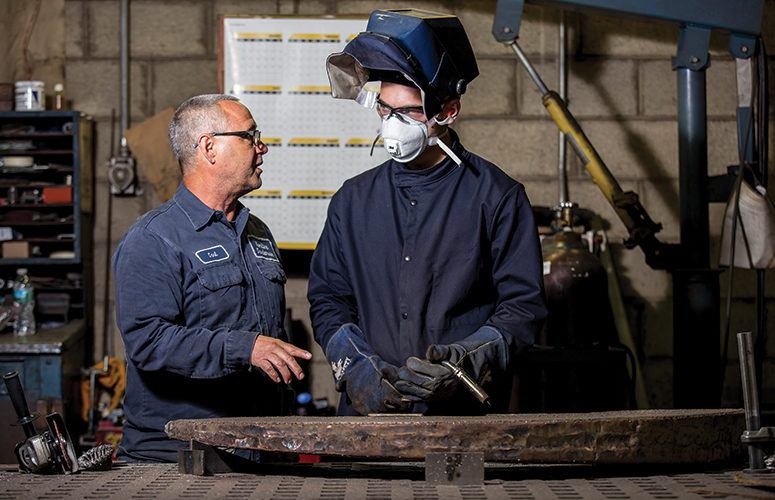
An Essential Industry with an Essential Need
Workforce development and finding talent are critical needs of manufacturers today.
By Jim Pytell, Assistant Editor On Oct 9, 2020When Gov. Phil Murphy signed an executive order in March that mandated the closure of all non-essential businesses in New Jersey in order to stem the spread of the coronavirus, many manufacturers wondered if they would be forced to cease production and shut their doors.
Instead, the state deemed all manufacturing “essential,” reaffirming the import of an industry that Sally White, senior director of business development at the New Jersey Manufacturing Extension Program (NJMEP), says, “connects the links in America’s supply chain.”
“This pandemic has lifted the curtain to reveal many eye-opening insights,” adds Elissa Santo, vice president of North Brunswick-based Atlantic Precision Technology. “Among them is the fact that manufacturing is not only something that is integral in our society, but something that engenders a sense of pride.”
White says that the industry also checks nearly all of the boxes you’d want in a career; it’s stable, provides opportunity for growth, utilizes the latest technology, pays well, and provides an overall enriching and engaging experience.
Why is it then, that manufacturers continue to cite finding talent as their biggest need?
“Manufacturing in the US is not dead,” Santo says. “Advanced manufacturing is thriving. It is a rewarding career path that offers challenges, healthy compensation and infinite opportunities for growth. Everyone in the industry knows this, but it feels like an open secret or a hidden truth. We need this message to reach students that may be naturally inclined toward this type of work.”
A Declining and Aging Workforce
Manufacturing employment in New Jersey fell to 6% of all jobs in 2018 compared to 14.6% in 1990, according to the New Jersey Department of Labor & Workforce Development’s (DOL) Office of Research & Information. At the same time, the industry still contributed $47.4 billion to New Jersey’s Gross Domestic Product (GDP) in 2018, which was 8.5% of all output in the state.
According to the County College of Morris, it is estimated that over the next decade, advanced manufacturing will need to fill 3.4 million jobs with the majority of those positions being related to the pending retirement of baby boomers.
An aging workforce is a problem for the manufacturing industry. According to DOL, the industry’s fastest growing age range is 55-64 years old, with the amount of workers over 65 tripling to 9% of the workforce since 1998.The biggest decline came from those age 35-44, and less than a quarter of the manufacturing workforce is currently under the age of 35.
It’s a Team Effort to Spark Interest and Cultivate Talent
The North Jersey Manufacturing Industry Partnership is a collaborative of manufactures who work with public partners to resolve various issues impacting the manufacturing sector in northern New Jersey.
“The businesses participating in the North Jersey Manufacturing Industry Partnership say that the group is all about manufacturers helping manufacturers, which manifests as tackling common issues that impact the sector, sharing resources and best practices, and engaging as thought partners, for example,” Kerri Gatling chief, New Jersey Industry Partnerships Department of Labor & Workforce Development, says.
Gatling says that one area the organization is currently focused on is connecting with millennials and Generation Z to educate and inform them about opportunities and career pathways in the manufacturing industry.
“In working with the state’s manufacturers and our public partners, we have discovered many students don’t think about careers in manufacturing, unless of course they have a parent or close relative in the industry. Manufacturing is often misconceived as a dirty job with no future, which is certainly not the case,” Gatling says. “Manufacturers in the partnership are passionate about connecting with students to talk about the opportunities in the industry to shake that misperception and look for young talent.”
“We’ve developed a number of programs [at NJMEP] that are all about getting people excited about the manufacturing sector,” White says. “The reason that they are not excited is simply because they don’t know about it.”
For example, NJMEP provides Registered Apprenticeship programs that are designed to move an apprentice from a low or no skill entry-level position to full occupational proficiency. The programs established under the National Apprenticeship Act are designed to protect the welfare of the apprentice. Upon finishing the training program, an apprentice earns a “Completion of Registered Apprenticeship” certificate, an industry issued, nationally recognized credential that validates proficiency in an apprenticeable occupation.
Colleges also play a key role in generating interest in manufacturing.
As the recipient of a $4-million CareerAdvance USA Grant, the County College of Morris is offering training and apprenticeship programs for those interested in manufacturing, including a “boot camp” program that offers three college credits, interactions with potential employers, and the use of the school’s new Advanced Manufacturing Center. Students can also earn certifications such as: OSHA-10, NIMS, and SolidWorks, in addition to having opportunities for scholarships, funding for under employment, as well as payment plan options.
Finally, the New Jersey Business & Industry Association (NJBIA) is the official state liaison to the National Association of Manufacturers (NAM), whose NAM Manufacturers Marketplace has more than 300,000 leading US manufacturers listed in a database, representing small and large manufacturers in every industrial sector. Subscribers to the marketplace receive comprehensive search capabilities to help them identify and engage with the best partners for their unique supply chain needs.
Invest in People
As mentioned above, it takes a team effort to tackle the challenges that the manufacturing industry faces.
While various organizations can tirelessly work to get people interested in the industry, as well as connect them with actual companies through various apprenticeships, there is still a responsibility on the manufacturers themselves to invest in people.
“It’s not only going to schools, talking to the students and parents, and the underemployed, but it’s also a critical message with the manufacturers saying ‘you have got to make the investment in people,’” NJMEP’s White says.
To access more business news, visit NJB News Now.
Related Articles:





